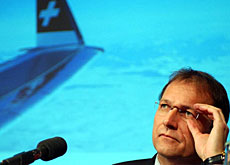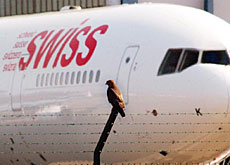Beleaguered Swiss battles to fill seats

Latest passenger numbers for the national airline, Swiss, show the embattled carrier is struggling to fill seats.
Faced with war in Iraq, the Sars pneumonia virus and industry overcapacity, experts are warning that the airline’s future has never been shakier.
On Wednesday, Swiss said it had carried a total of 2.7 million passengers during the first three months of 2003. Its average seat load factor was 67.9 per cent.
“Swiss continues to be challenged by the sluggish economic environment, Iraq war and the recent outbreak of Sars, all of which dampen the demand for air travel,” Swiss said in a statement.
Falling demand has also forced the airline to suspend one of its weekly flights between Zurich and Tokyo.
Deep concern
On Monday the Swiss economics minister, Joseph Deiss, expressed deep concern about the state of Swiss.
“There is an urgent need for some decision making,” he said, calling on the airline to jettison its loss-making businesses.
“As the economics minister, I can only say that I am concerned,” he added.
The comments have underscored the one-year-old airline’s increasing fragility.
“I wouldn’t buy the shares of Swiss,” Patrik Schwendimann, an analyst at Zurich Cantonal Bank, told swissinfo. “They have to improve. This means more cost cuts are likely.”
In recent days, the airline has done little to dispel the looming sense of crisis.
Crisis summit
Last week, CEO André Dosé called for an urgent summit between the government, Swiss and its key partners such as the Zurich airport company, Unique.
In a flurry of activity, Dosé also travelled to Brussels to meet the European Union’s transport commissioner, and visited Bern for talks with Switzerland’s transport minister, Moritz Leuenberger.
The meetings were accompanied by persistent media speculation that Dosé was positioning himself to ask for government assistance.
At the weekend, unconfirmed reports were published of a plan to cut the airline’s fleet and split the business into long-distance and regional divisions.
No support for subsidies
Last month, Swiss management declared a SFr980 million ($705 million) loss for 2002, and warned that 2003 would be the toughest year in the airline industry’s history.
While few people in Switzerland dispute that the airline is flying dangerously close to the wind, Switzerland’s politicians have declared themselves staunchly opposed to further capital injections.
In recent days, most sides of the political spectrum have ruled out more funding for airline.
Only the centre-left Social Democrats have left open the possibility of subsidies. However, they should only be considered if other European countries follow Washington’s decision to assist North American airlines, the party said.
Pierre Condom, a Geneva-based aviation industry expert who publishes a monthly aerospace magazine, told swissinfo that the government would not risk a fight with the EU by subsidising Swiss.
“The European Commission will never accept another injection of money into Swiss, at least in the short term,” Condom said.
Schwendimann takes a similar view, warning that Swiss can only expect government subsidies if other European nations act to boost their own national airlines first.
“[However], as a European airline you can’t bet on state aid these days. They really have to get out of this crisis on their own,” Schwendimann said.
National pride
While any decision by the government to deny Swiss a lifeline could have dire consequences for the company, Condom believes the cabinet is unlikely to throw good money after bad.
“It will be a political problem, but I don’t think it will be the same kind of political problem that Swissair was.”
“Recent polls have shown that Swiss people seem far less ready to pay,” he said.
Condom also believes the public desire for an airline that reflects national pride – a key reason why Swiss was given almost SFr1 billion in federal and cantonal funding – is also declining.
“What [people want] is an airline that serves Switzerland… and not a Swiss airline, in itself.”
Sars meltdown
Ever since being formed from the remains of Swissair, which collapsed in 2001, Swiss has struggled to cope with a stumbling global economy, the war in Iraq and competition from low-cost airlines.
Many of Swiss’s problems are similar to those facing airlines around the world.
On Tuesday, the Association of European Airlines said traffic by member airlines had fallen by 7.1 per cent during the second week of the Iraqi war, compared with the same March period last year.
Seat loads to the Middle East have more than halved, while European sectors saw a fall of 5.2 per cent. The figures followed a 12.3 per cent fall during the first week of the war.
Rod Eddington, the head of Europe’s largest airline, British Airlines, on Friday told a business lunch in Zurich that Sars had hit the industry hard.
“This is the worst I have ever seen, no doubt about that,” Eddington told a Swiss-British Chamber of Commerce gathering.
Eddington said demand for flights to Hong Kong had plummeted, while the company was building up “reserves to help us through very tough times”.
In a blow to Swiss hopes of joining the Oneworld Alliance, Eddington added that BA was focused on its own financial stability and would not consider any new alliances.
Nightmare scenario
Industry figures are now bracing for a potential “nightmare scenario”, triggered by the simultaneous impact of three different factors.
The first two are the war in Iraq, which has dampened demand in the Middle East and the Sars virus, which has eroded the Asian travel market
The third, and most unpredictable, factor is the possibility of another terrorist attack involving an airline.
Condom said it would not matter which airline was involved, the negative impact on trans-Atlantic traffic would be equally grim.
“It’s a dangerous time for Swiss. It’s a young company, and it is a lot like an aircraft taking off – it’s more sensitive to turbulences than an aircraft that’s cruising,” Condom said.
Should the industry’s worst nightmares come true, Swiss will be just one of many to collapse.
“At the end of the day, [the demise of] Swiss would be a small event in the middle of that catastrophic scenario.”
swissinfo, Jacob Greber
Swiss said it had carried a total of 2.7 million passengers during the first three months of 2003.
The airline’s average seat load factor was 67.9 per cent.
Last week, Swiss CEO André Dosé called for an urgent summit between the government, Swiss and its key partners.
In March Swiss posted a SFr980 million ($705 million) loss for 2002 and warned 2003 would be the toughest year in airline industry history.
Swiss politicians are opposed to further capital injections to help Swiss.

In compliance with the JTI standards
More: SWI swissinfo.ch certified by the Journalism Trust Initiative












You can find an overview of ongoing debates with our journalists here . Please join us!
If you want to start a conversation about a topic raised in this article or want to report factual errors, email us at english@swissinfo.ch.